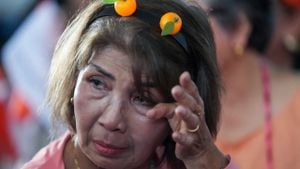Luís Medina, the son of Spain's 19th Duke of Feria, appeared before the Madrid Provincial Court this Tuesday, defending himself against allegations of fraud stemming from the purchase of medical supplies amid the pandemic. Medina, along with his business partner Alberto Luceño, faces accusations of defrauding the Madrid City Council out of six million euros by securing excessive commissions on the sale of face masks and other sanitary items.
During his nearly hour-long testimony, Medina attempted to counter the prosecution's claims, stating, "We wanted to help the City Council get the supplies it needed." Despite the gravity of the accusations, he remained adamant, declaring he never expressly discussed commission arrangements with city officials.
"At no point did I inform the City Council of my interest or intentions," Medina responded when questioned about his lack of disclosure. He insisted he did not feel obligated to reveal his financial involvement.
The Spanish Anti-Corruption Prosecutor's Office is seeking nine years of prison time for Medina, accusing him of fraud and falsifying documents. Luceño, facing 15 years for similar charges and additional tax offenses, allegedly inflated prices on products like masks, with costs skyrocketing by 60%, nitrile gloves by 81%, and tests by 71% compared to market prices, as outlined by judicial investigations.
The prosecution contends Medina and Luceño created urgency during the early pandemic chaos, leading city officials to believe they were providing assistance without any financial motives. Yet, as the case unravelled, it became clear the pair profited significantly, leading to accusations of deceit.
"We never stated we were doing this for free," reiterated Medina, directing his defense toward portraying their actions as altruistic. He emphasized, "It was our part to contribute during the chaotic time. I was merely facilitating contacts between Leno, the supplying company, and the Madrid authorities."
Throughout the questioning, Medina shifted some responsibility onto Luceño, affirming he was unaware of any negotiations over commissions particularly related to the nitrile gloves and tests. He defended his financial gain, saying, "With what I received, I was satisfied. It was merely my facilitator's fee."
Medina revealed he received only one million euros from their operations, significantly less than Luceño's reported five million. The prosecutor accentuated concerns over Luceño portraying the commission distribution under false pretenses.
One of the most damaging pieces of evidence came from Teresa María Olivares, the tax inspector who testified on Luceño's alleged deliberate efforts to evade taxes by manipulating corporate structures. She asserted Luceño’s dealings with Takamaka Invest—a company he set up solely to protect his earnings—meant he avoided large payments to the Spanish tax office.
"He structured this company to reduce his tax obligations," Olivares explained. "By doing so, he benefited from rates far below what he should have paid, resulting in losses exceeding 1.3 million euros to the treasury."
Further accusations suggest Luceño created fake documents indicating ties to the National Intelligence Center of Spain, raising alarms about the legality of his operations.
Medina's defense attempts to pivot focus away from personal misconduct, framing the partnerships and contractual dealings as standard business practices under extreme circumstances. He underlined the chaos of the period, stating, "The market was broken; there was high demand for products unavailable anywhere else, leading to inflated prices." He emphasized his lack of engagement with Luceño's price-setting, arguing, "I never discussed prices with suppliers, nor did I directly partake in setting product costs, which were fluid and reflected the market's erratic nature."
The prosecution's case documents indicate the two men reaped staggering profits from contracts totaling 12 million euros approved by the city, allowing them to siphon off over half the budget of public funds meant for emergency health services during the pandemic's height.
Again, Medina affirmed his original intentions were only to assist. "We presented the proposals and bridged the gap between supply and demand during desperate times," he said. His narrative hinges on minimizing liability by claiming previous interactions were simply to facilitate, not to deceive.
The court is expected to review testimonies from additional parties, including other sector officials and experts, as the trial progresses. Luceño is slated to take the stand next, which could provide new insights and potentially shift the dynamics of the defense and prosecution arguments alike.
Further developments will reveal how the tribunal interprets Medina's claims versus the prosecutorial narrative of deception and deliberate profit-making during one of Madrid's most challenging times.



